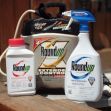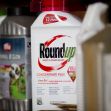Global agrochemical manufacturer Bayer is asking the U.S. Supreme Court to block thousands of lawsuits it is facing across the nation which allege the company failed to warn consumers about the cancer-causing dangers of its popular weed-killing product, Roundup.
This latest request from Bayer comes at a time when it's actively defending itself against lawsuits largely brought forward by everyday homeowners who have used the product. The lawsuits have been so pervasive that the company has set aside over $16 billion to settle claims.
Despite this ongoing litigation, Bayer has asked the high court to intervene in a Missouri case involving a man who developed non-Hodgkin’s lymphoma after he says he sprayed the weed killer in a St. Louis community garden. That man was later awarded $1.25 million in a settlement with the company.
Bayer maintains that federal pesticide laws prevent states from imposing their own labeling requirements on products and, as a result, these failure-to-warn lawsuits brought against the company - claims that point to state law violations - should be dismissed.
While states do have pesticide labeling laws, federal laws include preemption clauses that bar states from regulating certain aspects of a product through state-level labeling. It’s this aspect that Bayer takes issue with, arguing that lawsuits making claims regarding state violations should be dismissed.
Federal pesticide labeling laws are implemented by the Environmental Protection Agency (EPA) under the Federal Insecticide, Fungicide, and Rodenticide Act (FIFRA).
The cancer controversy with Roundup was first started because of a key ingredient, glyphosate, that was present in products sold to US residential lawn and garden markets. This ingredient has since been removed from residential products but remains in agricultural products used by farmers.
The agricultural products are designed to be used alongside genetically modified seeds that can withstand roundups' deadly effects. Bayer maintains in its claims to the high court that if these lawsuits persist, it will have to remove this ingredient from its agricultural products with devastating effects on the agricultural market.
Bayer's head of communication of the company's crop science division has shared that allowing these lawsuits to be pursued would be a threat to innovation in general and that “if glyphosate falls to the litigation industry, what could be next?”
This is not the first time Bayer has brought such a case to the High Court. In 2022, the Supreme Court declined to hear similar arguments after a California couple was awarded more than $86 million in their lawsuit, where they argued they developed cancer because they used the weed killer in their garden.
While the Supreme Court declined to hear the 2022 case, Bayer now argues the court should take up its case because lower courts have issued conflicting rulings. Last year, the 3rd U.S. Circuit Court of Appeals sided with Bayer in its ruling, while the 9th and 11th Circuit Courts ruled against it.
An attorney representing the St. Louis, Missouri, man has shared that Bayer’s latest attempts are fleeting, stating that Bayer is “really grasping at straws” and that the “reality is they don’t want to put the warning on it because they’re afraid” of reduced sales if customers learn the product may be unsafe.
Currently, over 181,000 Roundup lawsuits have been filed against the company, including a majority brought forward by residential users.
A bill was introduced in Iowa earlier this year to prevent these types of lawsuits, but it failed to pass. Similar legislation shielding pesticide makers from state "failure-to-warn" claims was also proposed in Tennessee, where it passed.






